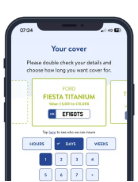With a recent survey commissioned by the temporary car insurance experts at Tempcover* finding nearly half of UK drivers (48%) admitting that they’ve been behind the wheel when they thought they may be over the legal drinking limit, it’s never been more important to ensure your lift back is courtesy of a sober driver, especially as we approach Christmas party season.
There’s often some pressure to drink at this time of year – both ahead and while you’re at the Christmas party. The survey found that:
- Three in 10 people felt pressured to let someone else drive despite being unsure about their sobriety, while 21.3% reported feeling pressured to drive despite knowing they were over the limit.
- Almost two in five people are more likely to take risks and drink-drive during the festive season compared to any other time of year.
There are also some concerns over the public’s awareness of drink-driving with only two in five respondents knowing the limit, while three in five admitted they don’t know or are unsure of it.
How does alcohol affect driving?
Drinking alcohol will affect your reaction times, your vision and ability to concentrate. When you have alcohol, the brain takes longer to receive messages from your eyes, processing information is a challenge and you’ll have slower reactions.
This means getting behind the wheel of a car is extremely dangerous – and potentially fatal – when you have drunk too many units.
The Department for Transport’s latest figures state there were 6,800 drink-drive casualties in 2022, with 300 drink-drive fatalities and 1,920 drink-drive killed or seriously injured (KSI) casualties in 2022.
What is the legal drinking limit?
The legal drink-drive limit depends on the individual. It is based on:
- Your weight, age, sex and metabolism.
- How much alcohol – and what type – you’re drinking.
- What you’ve eaten recently.
- Your stress levels at the time of driving.
Level of alcohol
- Micrograms per 100 millilitres of breath – 35 (England, Wales and Northern Ireland), 22 (Scotland).
- Milligrammes per 100 millilitres of blood – 80 (England, Wales and Northern Ireland), 50 (Scotland).
- Milligrammes per 100 millilitres of urine – 107 (England, Wales and Northern Ireland), 67 (Scotland).
In Scotland, one drink might put you over the limit. In England and Wales, it could take slightly more but the safest approach is always zero alcohol. Even small amounts of alcohol can affect your driving. Police advise that the best option is to avoid alcohol altogether if you are driving somewhere.
What happens in a drink-driving test?
If the police suspect a driver of drinking (this could be for erratic or overzealous driving or committing a traffic offence), they have the right to stop any vehicle at their discretion. They can then carry out a screening breath test using a breathalyser.
If the driver fails this test, or they believe they have had too much alcohol to drive safely, they will take the driver to a police station for a final breath test. Here, the driver will need to provide two more breath specimens using a complex breathalyser, with the lowest reading confirming whether they were driving above the drink-driving limit.
The police can also request a urine sample or blood test, with failure to provide this being a criminal offence. Visit Drinkaware’s website for more information about drink-driving tests.
What are the penalties for drink driving?
Anyone caught drink driving faces serious penalties and legal consequences including potential imprisonment, a driving ban and fines. The actual penalty will depend on your offence and is decided by the magistrates who hear your case.
Potential penalties for being in charge of a vehicle while above the legal limit include:
- Three months’ imprisonment.
- A fine of up to £2,500.
- A possible driving ban.
Potential penalties for driving or attempting to drive while above the legal limit include:
- Six months’ imprisonment.
- An unlimited fine.
- A one-year driving ban (three years if convicted twice in 10 years).
Potential penalties for refusing to provide a blood, breath or urine specimen:
- Six months’ imprisonment.
- An unlimited fine.
- A one-year driving ban (three years if convicted twice in 10 years).
Potential penalties for causing death by careless driving when under the influence of alcohol:
- Life imprisonment.
- An unlimited fine.
- At least a five-year ban from driving.
Convicted drivers will also have to take an extended driving test before your licence is returned. If they are considered a high-risk offender, they will not automatically get their licence back.
If a driver is banned for over 12 months, they may be able to reduce this length by taking a drink-drive rehabilitation scheme (DDRS). The decision on whether to offer this is down to the court.
Safer driving all year long
Although Christmas may be the peak, drink-driving is an all year-round issue. The safest way to avoid penalties and punishments is to enjoy driving without the aid of alcohol – whatever the time of year.
Tempcover It this Christmas
One way of making it easier for someone sober to drive your vehicle home is temporary car insurance. This short-term solution helps car owners get a quote for trusted friends and family to legally drive their vehicle in under two minutes.
With Tempcover, you can get them insured to drive your vehicle – whether they have a licence and don’t own a car or you just need something bigger to fit everyone in – in next to no time. This way, you can arrange safe transport home from any office Christmas party or seasonal gathering.
*Tempcover conducted a survey of 2,000 Brits on their drink-driving habits in October 2024.

Frequently Asked Questions
How much does it cost to get your driving licence back after a drink-driving ban?
If you have been disqualified for drink or drug driving, you can reapply for your provisional or full driving licence before your disqualification period ends. The DVLA will send a D27 renewal form 56 days (90 days if you’re a high-risk offender) before the last date of your disqualification.
- If you were disqualified for drink driving and need to pass a medical exam with a DVLA doctor, the charge is £90.
- If you were disqualified for drink driving and do not need to pass a medical exam, the charge is £65.
How much will car insurance increase after a drink-driving conviction?
This will depend on the nature of the conviction. Premiums will increase for as long as the conviction remains in place. Some insurers may also be unwilling to offer you policy due to the level of risk involved.
Confused.com’s data from Q3 2024 found the average annual insurance quotes* for drivers with drink-driving convictions ranging from £1,259 to £4,637.
*These figures are only a guideline. Every quote will depend on personal circumstances.
Do you have to declare a drink-driving conviction to your workplace?
If your contract requires you to disclose convictions, then you should tell your current workplace about your drink-driving conviction as soon as possible. Failing to do so would be a breach of contract.
The information you need to give to a potential employer about a conviction or caution depends on:
- If the conviction or caution is on your basic criminal record.
- The role you’re applying for.
The information you are legally expected to provide also depends on if your driving conviction is ‘spent’. Under the Rehabilitation of Offenders Act 1974, a drink-driving conviction is considered ‘spent’ after five years.
Be aware that a driving ban or fine with penalty points that appears on your driving record is known as an ‘endorsement’ – and this can stay on your driving record longer than your criminal record.
This means a potential employer, university or college might find out about a driving ban or fine after it’s spent, if they request to check your driving record.
Please note that fixed penalty notices (FPN) and penalty charge notices (PCN) are fines for minor driving offences. They will not appear on your criminal record unless a court gives you a conviction because of one.
Will a drink-driving ban stop me travelling abroad?
A UK drink-driving conviction may prevent you travelling to foreign countries. Every country has its own policy in place for admitting entry to people with convictions. Check national government websites for details and requirements of entry.

